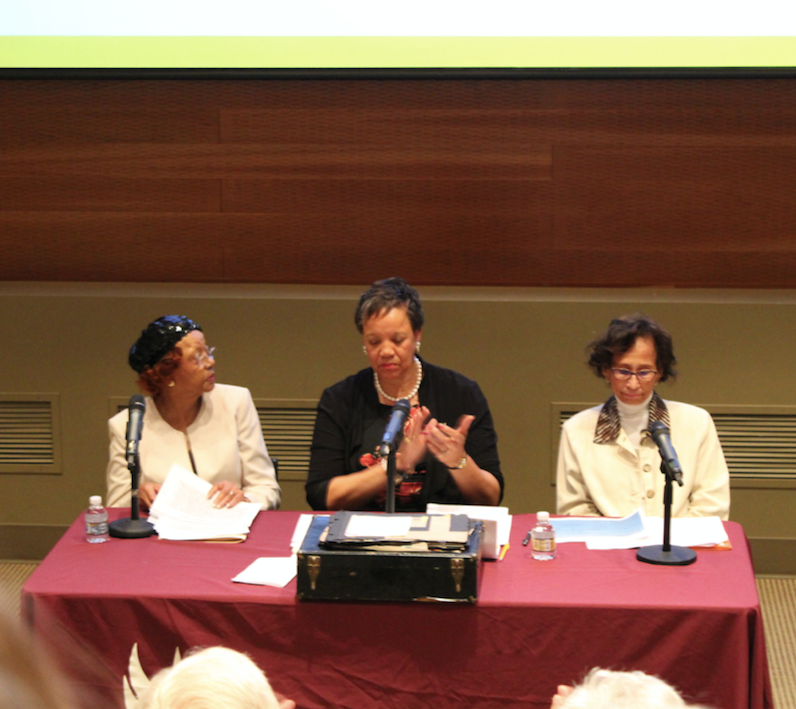The women behind some of Rock Hill’s famous civil rights protests were finally able to share their stories.
On April 9, the Winthrop Women’s Coalition sponsored an event focusing on the women of the civil rights movement in Rock Hill. The panel called “Hidden Figures of The Civil Rights Movement: Segregation and Activism in Rock Hill” was moderated by the chair of the political science department, Dr. Jennifer Disney. Panelists Phyllis Thompson Hyatt, Darnell Ivory and Dr. Gladys Feely Robinson spoke about their experiences in Rock Hill in the 60s and 70s at the height of the civil rights movement.
Hyatt was a member of the City Girls, an activist group that worked with the Friendship Nine. The City Girls took part in the infamous sit-in at McCrory’s lunch counter in downtown Rock Hill.
Ivory is the daughter of Rev. Cecil Ivory, a prominent civil rights activist in Rock Hill that organized and led many protests, including a bus boycott to fight segregation.
Robinson is the chair for The African-American Cultural Resources Advisory Committee for Rock Hill. This committee is responsible for creating the African-American Business District Monument on West Black Street.
All of the panelists attended segregated schools until they graduated high school. For her academic career, Robinson attended “equalization schools.”
“Equalization schools were built for children here in the state of South Carolina. It was South Carolina’s way of getting around the rule of Brown v Board of Education with segregated schools being unconstitutional,” Robinson said. “A segregated setting is all I ever knew. And if it’s all you ever know, you have nothing to compare it to because that was the normal.”
Segregation was all the women knew. It created a tight-knit community that allowed black parents to be closely involved in their children’s education.
“The beauty of it was that our parents always had hands on with our education. Our parents, the teachers, the principal, everybody in the school, they either went to the same church, they socialized together, they were members of the same fraternity or sorority,” Ivory said.
Hyatt said she “enjoyed” segregation and that when integration became the new normal, many of her friends had a distaste for it.
“Segregated public schools were good for me. I enjoyed them. So when integration came along, that’s another story,” Hyatt said.
While segregation was all that these women knew, and even preferred, while growing up and going through school, that does not mean it provided the necessary tools for a quality education. Black students would get the hand–me–downs of white students. Their school buildings were run down.
“We were not getting the same resources. We were not getting the quality books. We were not getting the quality materials. We were getting the hand–me–downs. We didn’t know that, but we accepted it because we were told this is the way it was,” Ivory said.
Hyatt’s mother worked in downtown Rock Hill, and she would often go visit her mother after school until work was finished. In the meantime, Hyatt would go to McCrory’s to get her favorite meal: a BLT and a cherry Coke. However, she was not allowed to sit down. Even if there were plenty of seats open, she had to wait until an employee acknowledged her before she could be served.
“Just about every day I had to visit McCrory’s… I would go there and my experience was I had to stand at the end of the counter and wait for someone to wait on me. There were seats, there were booths, but I could not sit there. I would stand there until somebody decided to wait on me,” Hyatt said.A
While Hyatt was able to patronize McCrory’s with little issue, other than her being told she could not sit down with her white friends for lunch, Ivory shared a story with a different ending.
Ivory’s father attempted to eat at McCrory’s one day after he had purchased a trash can for his office from the business. He wanted to sit at the whites-only lunch counter. The police were called on him, and he was physically forced out of the store.
She also spoke about the days that businesses were open for African-Americans. For one day only, they were allowed to take part in activities typically reserved for white people.
“There were days… that we could only do things on a certain day. That’s the only day that the African Americans and the blacks would be able to participate. We accepted that arrangement, not knowing that we should have deserved more. That was what the Friendship Nine, the ‘jail, no bail’ and the fight essentially was all about because enough is enough is enough,” Ivory said.
She addressed the crowd, a crowd so large that Dina’s Place was full and the remainder of the audience had to watch a live stream of the panel in Richardson Ballroom next door, and encouraged them to continue her father’s legacy and stand up against injustice.
“You’re here probably because you agree to fight against injustice. You agree that it was wrong. And sometimes when we hear the little echoes of it today, you know that something needs to be done,” Ivory said.




